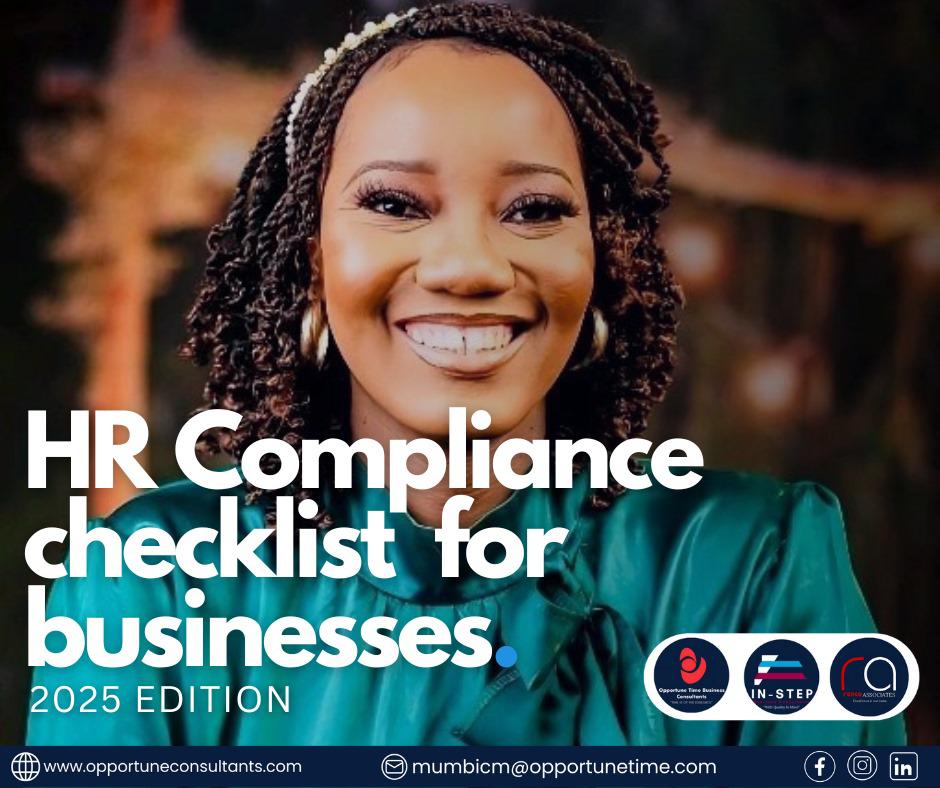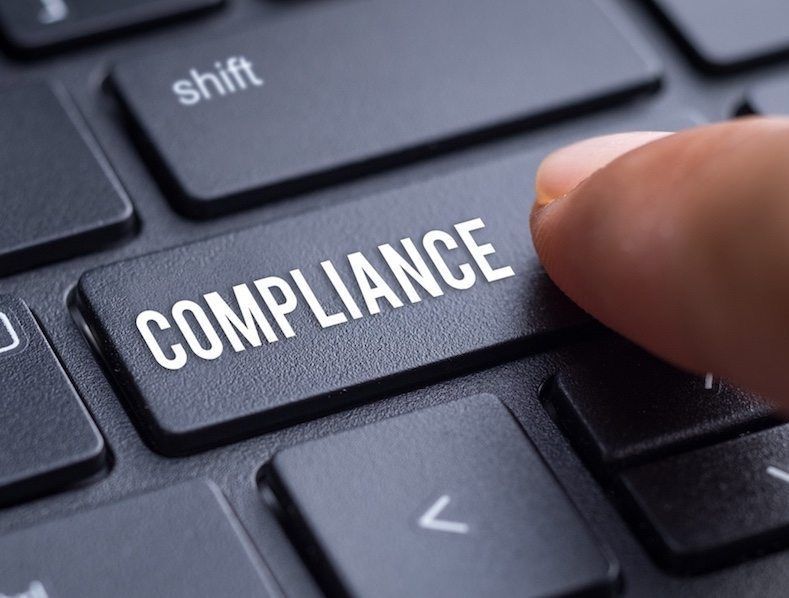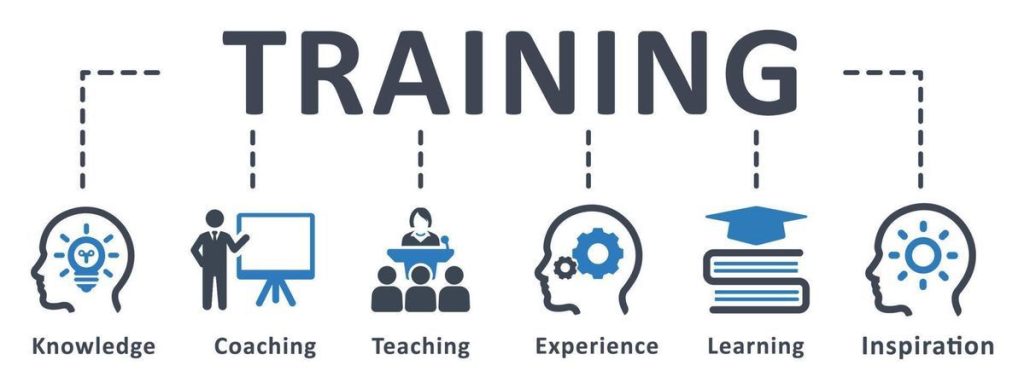HR Compliance Checklist for Businesses in Zambia (2025 Edition)

Introduction
In Zambia’s fast-changing business landscape, compliance with labour laws and statutory obligations has become more than just a regulatory requirement it is a strategic tool that safeguards both the employer and the employee.
A company that stays compliant not only avoids penalties and legal disputes but also fosters a workplace culture that values fairness, accountability, and employee well-being.
This 2025 HR Compliance Checklist outlines the key areas every business must address to remain in line with:
The Employment Code Act
The Zambia Revenue Authority (ZRA)
The National Pension Scheme Authority (NAPSA)
The Ministry of Labour and Social Security
The checklist covers:
Registration and licensing
Employment contracts
Payroll and contributions
Health and safety
Leave and benefits
Working hours
Disciplinary procedures
Equal opportunity
Training
Compliance monitoring
By following this guide, businesses will ensure operational efficiency and long-term growth while protecting their most valuable asset their people.
Business Registration and Licensing
The first step toward HR compliance is ensuring that your business is properly registered and licensed. Every company in Zambia must:
Register with the Patents and Companies Registration Agency (PACRA) this provides legal recognition and establishes the entity as an employer.
Obtain a Taxpayer Identification Number (TPIN) from the Zambia Revenue Authority (ZRA), essential for registering employees for Pay-As-You-Earn (PAYE) and other tax obligations.
Acquire additional licenses depending on the sector (e.g., trading permits, construction permits, food and health permits).
Businesses should maintain an updated compliance file including:
PACRA certificate of incorporation
ZRA registration confirmation
Copies of all sector-specific licenses


Employment Contracts and Documentation
The Employment Code Act mandates that every employee must have a signed contract that outlines:
Job title and description
Salary and benefits
Probation period
Working hours
Leave entitlements
Termination clauses

Each employee should have a complete personnel file containing:
NRC copy
Relevant qualifications
Signed job description
Bank details and emergency contact information
Performance appraisals, disciplinary records, and training evidence
Proper documentation ensures transparency, aids inspections, and prevents disputes.
.
Payroll and Statutory Contributions
Employers must accurately calculate salaries, make correct deductions, and remit contributions on time:
NAPSA: Register all eligible employees and submit both employer and employee contributions by the 10th of the following month.
PAYE: Deduct and remit to ZRA by the 14th of each month.
Withholding Tax (WHT): Account for where applicable.
Maintain payroll records including:
Payslips
Tax returns
Remittance receipts
Non-compliance can lead to penalties, interest, or director liability. Establish a payroll calendar and reconcile monthly.
Health and Safety Compliance
Employers must adopt measures that reduce workplace risks under Occupational Health and Safety (OHS) regulations.
Key requirements include:
Developing and implementing an OHS policy covering risk assessments, hazard identification, and emergency procedures
Appointing and training safety representatives or committees
Providing first aid kits, fire extinguishers, and safety signage
Conducting regular employee safety training
Maintaining accident registers and reporting serious incidents
Compliance protects lives, enhances reputation, and boosts productivity.


Leave and Benefits Management
Under the Employment Code Act, employers must manage leave entitlements properly:
Annual Leave: At least two days per month of service (about 24 days per year)
Maternity Leave: 14 weeks
Paternity Leave: At least five days
Sick Leave: Supported by medical certificates
Compassionate Leave: Clearly defined and consistently applied
Maintain detailed leave records to prevent disputes and support employee well-being.
Working Hours and Overtime
Standard working hours in Zambia:
48 hours per week, usually over six days
Employers must:
Classify hours beyond this limit as overtime and compensate at legal rates
Respect rest days, Sundays, and public holidays unless scheduled and compensated
Monitor attendance through timesheets or biometric systems
Failure to comply can lead to disputes, penalties, and employee dissatisfaction.
Disciplinary and Grievance Procedures
Every workplace must have fair, written procedures that follow the Employment Code Act.
Disciplinary procedures should:
Be progressive — verbal warning → written warning → dismissal
Allow employees to defend themselves in hearings
Grievance procedures should:
Allow employees to report unfair treatment, harassment, or other issues
Ensure confidentiality and fairness
Document all cases properly to demonstrate due process and prevent claims of unfair dismissal.
Equal Opportunity and Non-Discrimination
Employers must uphold workplace equality through:
Anti-discrimination and anti-harassment policies
Equal pay for equal work
Training managers on objective recruitment and promotion
Safe reporting channels for harassment or discrimination
Compliance enhances company culture and reputation while preventing legal disputes.
.

Training and Development
Employers must:
Provide induction programs for new employees covering company policies, roles, and rights
Offer ongoing training in areas like occupational safety, compliance, and professional growth
Keep training records to show commitment to compliance and development
Continuous training improves productivity and reduces workplace accidents

Compliance Monitoring and Reporting
No compliance program is complete without consistent monitoring. Businesses should:
Review HR policies annually to reflect legal changes
Conduct internal audits to verify contracts, payroll accuracy, and statutory remittances
Prepare for labour inspections with organized documentation (contracts, payslips, NAPSA returns, tax filings)
Keep records for at least five years
Regular compliance checks help detect and correct issues before they escalate.
Conclusion
HR compliance is a continuous journey requiring diligence, systems, and ethical commitment. From registration to safe workplaces, fair contracts, and accurate payroll systems, each step protects both the company and its employees.
By following this HR Compliance Checklist for 2025, businesses in Zambia can stay aligned with the Employment Code Act, NAPSA, ZRA, and labour regulations building integrity, loyalty, and sustainable growth.
Staying compliant isn’t just about following the law it’s about building trust, protecting your workforce, and positioning your business for sustainable success.
At Opportune Time Business Consultants, we help businesses navigate Zambia’s HR, tax, and statutory compliance landscape with confidence.
Get in touch with our team today to schedule a compliance review or consultation and ensure your business remains aligned with the latest labor and regulatory standards.
